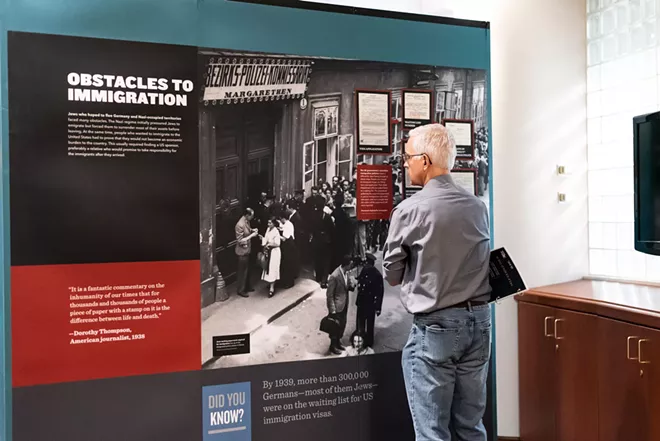The "Americans and the Holocaust" exhibition tells two stories.
The first is a harrowing one with which we are all too familiar: The systematic persecution and extermination of European Jews by Nazi Germany and its allies, which resulted in the murder of 6 million people between 1933 and 1945.
In the second, less-known story, America's bureaucratic incompetence and all-consuming fear of outsiders led to a glaring disconnect between the country's disapproval of the Nazi treatment of Jews and its desire to act. This moral stalemate rendered America largely ineffective in responding to requests for help from Jewish people.
The exhibition, currently displayed in the Rare Reading Room on the third floor of Gonzaga University's Foley Library, asks audiences to critically examine the documents presented, as well as their own preconceived notions about America's response to the Holocaust.
The exhibition contains four distinct sections, which chronicle American history leading into the Holocaust and then World War II. These sections contain primary source materials that demonstrate America's awareness of the Holocaust and unfortunate lack of action. One 1938 newspaper article from the Los Angeles Examiner sticks out, with the headline "Nazis warn world Jews will be wiped out unless evacuated by democracies."
"You sort of expect people to go through in a very passive manner, and they really haven't," says Dustin Gomez, program assistant at Foley Library. "They're really engaging with the ideas and having conversations."
The exhibition was originally created in 2018 and is permanently housed at the United States Holocaust Memorial Museum in Washington, D.C. In a continued effort to educate a wider audience about the Holocaust, the museum, in collaboration with the American Library Association, sponsored the creation and transportation of the 1,100-square-foot traveling exhibition to 50 U.S. libraries.
According to Brad Matthies, associate dean of Gonzaga University's Foley Library Center, the application process to host the exhibit was rigorous. When he reviewed the application back in 2019, Matthies said the most important question he needed to answer was, "Do we have a good network?"
As it turns out, due to Gonzaga University's community outreach efforts through groups like the Jewish Bulldogs and the Center for the Study of Hate, as well as contacts established by library Dean Paul Bracke, many organizations were ready to submit glowing reference letters on the Foley Library's behalf. In total, about 20 organizations endorsed the library, including local synagogues, on-campus departments and human rights groups.
Out of 250 public and academic libraries that applied, Foley Library was one of 50 selected to host the exhibition. Matthies was elated.
"I actually got the announcement when I was at a doctor's appointment," he recalls.
Unfortunately, shortly after the Foley Library was awarded the traveling exhibit, Gonzaga's campus shut down due to COVID. Matthies says this happened the day after he and his colleagues had finished setting up the exhibition, which was "devastating." The exhibition sat untouched for three months before a small crew could go in and pack up the materials to send back to D.C.
Matthies says during the height of COVID, he and his colleagues went to work strengthening relationships with various partners, including the Holocaust Center for Humanity in Seattle.
These efforts culminated into a panel discussion held on Sept. 8 with Holocaust survivor and Spokane resident Carla Peperzak, now 98, as the keynote speaker.
As a teenager, she aided the Dutch resistance by hiding fellow Jews and forging identity cards so members of the Jewish community could go undetected by Nazi officers. Peperzak is committed to sharing her experience as a member of the Holocaust Center for Humanity's Speakers Bureau.
The panel discussion, "Remembering Our Past to Inform Our Future," drew upon Peperzak's example of bravery and called upon the audience to stand firm against hatred. Vanessa Waldref, U.S. attorney for the Eastern District of Washington, spoke at the event, declaring that when it comes to acts of hate, "reporting is critical."
In light of the prevalence of hate acts, Matthies encourages audiences to "engage with [the exhibition] and apply it to some of the hate and rhetoric that we're seeing today." ♦
Americans and the Holocaust • Through Oct. 6, open Mon-Tue, Thu-Sun from 1-5 pm; Wed from 3-7 pm • Free • Gonzaga University Foley Library, third floor • gonzaga.edu/foley-library • 509-313-6533

